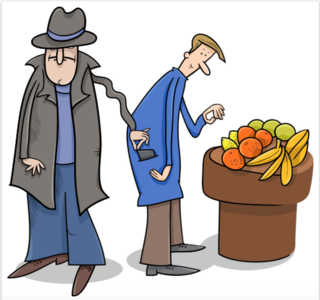Law and Crime
5 Surprising Facts About Crime and the Coronavirus
The crime rate has dropped in the wake of the virus.
Posted March 29, 2020

There is a widespread belief that economic downturns and disasters produce crime and chaos. But the data don't support this idea in the case of the coronavirus.
1. Crime is currently plummeting. In the wake of the coronavirus, along with an unpredictable recession, the crime rate is going down. The Washington Post reports, "The first weeks of pandemic in the nation's largest city spurred a double-digit drop in crime, as the bad guys seem to be just as scared of the novel coronavirus as everyone else... Last week New York City recorded a single murder, compared with eight the week before. Burglaries and assaults were each down about 18 percent compared with the previous week." Crime is also falling in the UK. The Guardian reports that "The coronavirus crisis has led to a drop in recorded crime, by as much as 20 percent in some areas."
2. Crime rates fell during the Great Recession. The Wall Street Journal reported that in the aftermath of the Great Recession in 2008, crime rates dropped. In 2009, the FBI reported an 8 percent drop in the nationwide robbery rate and a 17 percent reduction in the auto-theft rate from the previous year. Furthermore, between 2008 and 2010, New York City reported a 4 percent decline in robberies and a 10 percent drop in burglaries. Boston, Chicago, and Los Angeles had similar declines.
3. Crime rates fell during the Great Depression. When we think of the early 1930s, many of us imagine Bonnie and Clyde, bootleggers, and train robbers. But during the Great Depression, crime rates fell. As this NPR article puts it, "The Depression years had very little crime. With the economy's current troubles, many people assume a crime wave is just around the corner. But criminologists say that's just an American myth."
And this article from UCLA: "But crime overall during the Depression remained steady, actually falling a bit; murders dropped considerably, notwithstanding Prohibition and organized crime's role in bootlegging. Short answer: America's worst economic period did not produce a rise in crime."
4. Social solidarity increases during hard times. Communities that undergo disasters rarely descend into chaos. In fact, social solidarity often increases.
In an examination of social responses to natural disasters in the U.S., the social scientist Charles Fritz found no instance of a sustained panic after a widespread catastrophe. According to Fritz, disasters create a "community of sufferers." The struggle to overcome the dangers of a disaster and re-stabilize social life provides a structure and purpose to human activity that is absent in everyday life. Under these conditions, people use tragedy as a common frame of reference. Differences become less important.
5. Humans evolved to overcome hardship. The association between threat and solidarity is not random. Cooperating to overcome threats is a defining feature of Homo sapiens. Yuval Harari, the author of Sapiens, notes that one-on-one a chimpanzee would defeat a human. But 1,000 humans would defeat 1,000 chimpanzees. This is because the cooperative skills of humans far outpace those of chimpanzees. Michael Tomasello, an expert in chimpanzee cognition, has said, "It is inconceivable that you would ever see two chimpanzees carrying a log together."
Sounds like what a scientist in a Planet of the Apes movie would say right before the second act. But it's true. Chimps don't cooperate like us.
Humans desire obstacles to overcome. Francis Fukuyama once wrote, "if men cannot struggle on behalf of a just cause, then they will struggle against the just cause. They will struggle for the sake of struggle. They will struggle, in other words out of a certain boredom: for they cannot imagine living in a world without struggle."
This suggests that when the current struggle is over, we will go back to exaggerating or fabricating crises to overcome. But for now, we have a real one.


